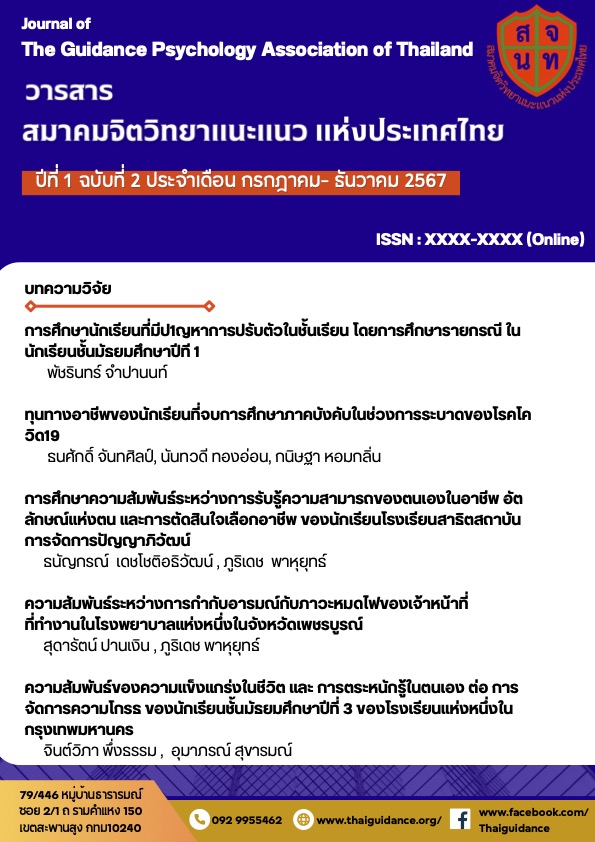The The Relationship Between Resilience and Self-Awareness on Anger Management among Grade 9 Students of a School in Bangkok Metropolis
Keywords:
resilience, self-awareness, anger management, secondary school students, adolescent psychologyAbstract
The objectives of this study were (1) examine the level of anger management classified by personal factors, including gender, Grade Point Average (GPA), and monthly allowance among grade 9 students of a School in Bangkok (2) investigate the relationship between resilience and anger management among Grade 9 students of a School in Bangkok and (3) explore the relationship between self-awareness and anger management among Grade 9 students of a School in Bangkok. The sample consisted of 271 students. Data was collected using a personal factor questionnaire, Anger management scale, Resilience test, and Self-awareness test. Statistical methods used for data analysis included frequency, percentage, mean, standard deviation, Pearson's correlation coefficient, and one-way ANOVA.
The findings revealed which (1) There is a significant difference in anger management between genders, with male students tending to exhibit higher levels of anger expression, while female students are more likely to employ anger control. Students with higher GPAs demonstrated better anger management compared to those with lower GPAs. Additionally, students receiving a monthly school allowance between 2,001 and 4,000 baht exhibited moderate levels of anger management. (2) Resilience was found to have a significant positive correlation with anger management (r = 0.45, p < 0.01), with students possessing higher resilience demonstrating superior control over their anger, ranging from moderate to high levels. (3) Self-awareness was moderately and positively correlated with anger management (r = 0.40, p < 0.01), indicating that students with greater self-awareness are better equipped to manage their anger more effectively.
References
คมสันต์ สมสุข. (2561). ผลกระทบของความแข็งแกร่งในชีวิตและการตระหนักรู้ในตนเองต่อการจัดการความโกรธในนักเรียนมัธยมศึกษาปีที่ 3. วารสารการแนะแนวการศึกษา, 3(2), 45-58.
กุลนันท์ เจริญสุข. (2554). ผลของโปรแกรมการจัดการความโกรธต่อพฤติกรรมก้าวร้าวของนักเรียนมัธยมศึกษา. วารสารสมาคมแนะแนวจิตวิทยาแห่งประเทศไทย, 2(1), 25-40.
พิชญา สุนทราภิรมย์. (2558). การพัฒนาความตระหนักรู้ในตนเองเพื่อเสริมสร้างความสามารถในการจัดการอารมณ์ในนักเรียนมัธยมศึกษา. วารสารจิตวิทยาการศึกษา, 4(3), 61-74.
สุธาสินี จันทร์จิรา. (2562). ผลของการฝึกโปรแกรมความแข็งแกร่งในชีวิตต่อการลดพฤติกรรมเสี่ยงในนักเรียนมัธยมศึกษา. วารสารการแนะแนวและจิตวิทยาการศึกษา, 15(1), 45-59.
ทัศไนย วงศ์สุวรรณ. (2542). ผลของการปรึกษาเชิงจิตวิทยาแบบกลุ่มตามแนวพิจารณาเหตุผล อารมณ์และพฤติกรรม ต่อความโกรธของนักเรียนวัยรุ่น (วิทยานิพนธ์ปริญญาโท, จุฬาลงกรณ์มหาวิทยาลัย). ฐานข้อมูลวิทยานิพนธ์จุฬาลงกรณ์มหาวิทยาลัย. https://cuir.car.chula.ac.th/handle/123456789/12851
พัชรินทร์ นินทจันทร์, ศรีสุภางค์ ลิมป์ กาญจนวัฒน์, และคณะ. (2559). ความแข็งแกร่งในชีวิตและการปรับตัวของนักเรียนมัธยมศึกษา. วารสารพฤติกรรมศาสตร์, 22(1), 32-44.
ทัศนีย์ สุริยะไชย. (2554). การพัฒนาแบบวัดการตระหนักรู้ในตนเองในนักเรียนมัธยมศึกษา. วิทยานิพนธ์ปริญญาโท สาขาจิตวิทยา, มหาวิทยาลัยเชียงใหม่.
สุพัตรา วิไลวงศ์. (2562). การจัดการความโกรธในวัยรุ่น: ปัจจัยที่มีผลต่อพฤติกรรม. วารสารจิตวิทยา, 25(2), 90-102.
ณัฐวุฒิ เกิดมีสุข. (2561). ความสัมพันธ์ระหว่างความแข็งแกร่งในชีวิตกับการจัดการความโกรธในวัยรุ่น. วารสารสุขภาพจิตแห่งประเทศไทย, 26(1), 45-58.
American Psychological Association. (2023). Anger management: Understanding and controlling anger. https://www.apa.org/topics/anger/control
Archer, J. (2004). Sex differences in aggression in real-world settings: A meta-analytic review. Review of General Psychology, 8(4), 291-322.
Burney, N. & Kromrey, J. D. (2001). Initial development and score validation of the anger style profiles. Measurement and Evaluation in Counseling and Development, 34(1), 23-39.
Dalili, S., & Zohuri, B. (2023). Emotional regulation and problem-solving: Strategies for improving anger management. Journal of Psychological Research, 12(4), 145-159.
Dahlen, E. R., & Deffenbacher, J. L. (2001). Anger management: Empirical and theoretical perspectives. Current Psychology: Developmental, Learning, Personality, Social, 20(3), 193-204.
Fernandez, E., & Johnson, S. L. (2016). Anger management techniques in clinical practice. Journal of Clinical Psychology, 72(4), 373-388.
Goleman, D. (1995). Emotional intelligence: Why it can matter more than IQ. Bantam Books.
Grotberg, E. H. (1995). A guide to promoting resilience in children: Strengthening the human spirit. Early Childhood Development: Practice and Reflections.
Miller, R. T., Zohra, P., & Smith, A. G. (2022). Self-awareness and its role in emotional regulation and anger management. Psychology and Behavior, 14(2), 50-67.
Spielberger, C. D. (1996). State-Trait Anger Expression Inventory (STAXI): Professional manual. Psychological Assessment Resources.
Spielberger, C. D., Krasner, S. S., & Solomon, E. P. (1995). The experience and expression of anger: Construction and validation of an anger expression scale. Personality and Individual Differences, 19(2), 371-380.
Brown, K. W., & Ryan, R. M. (2003). The benefits of being present: Mindfulness and its role in psychological well-being. Journal of Personality and Social Psychology, 84(4), 822-848.
Siegel, D. J. (2007). The mindful brain: Reflection and attunement in the cultivation of well-being. W. W. Norton & Company.
Additional Files
Published
How to Cite
Issue
Section
License
Copyright (c) 2024 (The Guidance Psychology Association of Thailand

This work is licensed under a Creative Commons Attribution-NonCommercial-NoDerivatives 4.0 International License.
บทความที่ได้รับการตีพิมพ์เป็นลิขสิทธิ์ของ สมาคมจิตวิทยาแนะแนวแห่งประเทศไทย
ข้อความที่ปรากฏในบทความแต่ละเรื่องในวารสารวิชาการเล่มนี้เป็นความคิดเห็นส่วนตัวของผู้เขียนแต่ละท่านไม่เกี่ยวข้องกับสมาคมจิตวิทยาแนะแนวแห่งประเทศไทย และบุคลากรท่านอื่น ๆ ใน สมาคมฯ แต่อย่างใด ความรับผิดชอบองค์ประกอบทั้งหมดของบทความแต่ละเรื่องเป็นของผู้เขียนแต่ละท่าน หากมีความผิดพลาดใดๆ ผู้เขียนแต่ละท่านจะรับผิดชอบบทความของตนเองแต่ผู้เดียว



